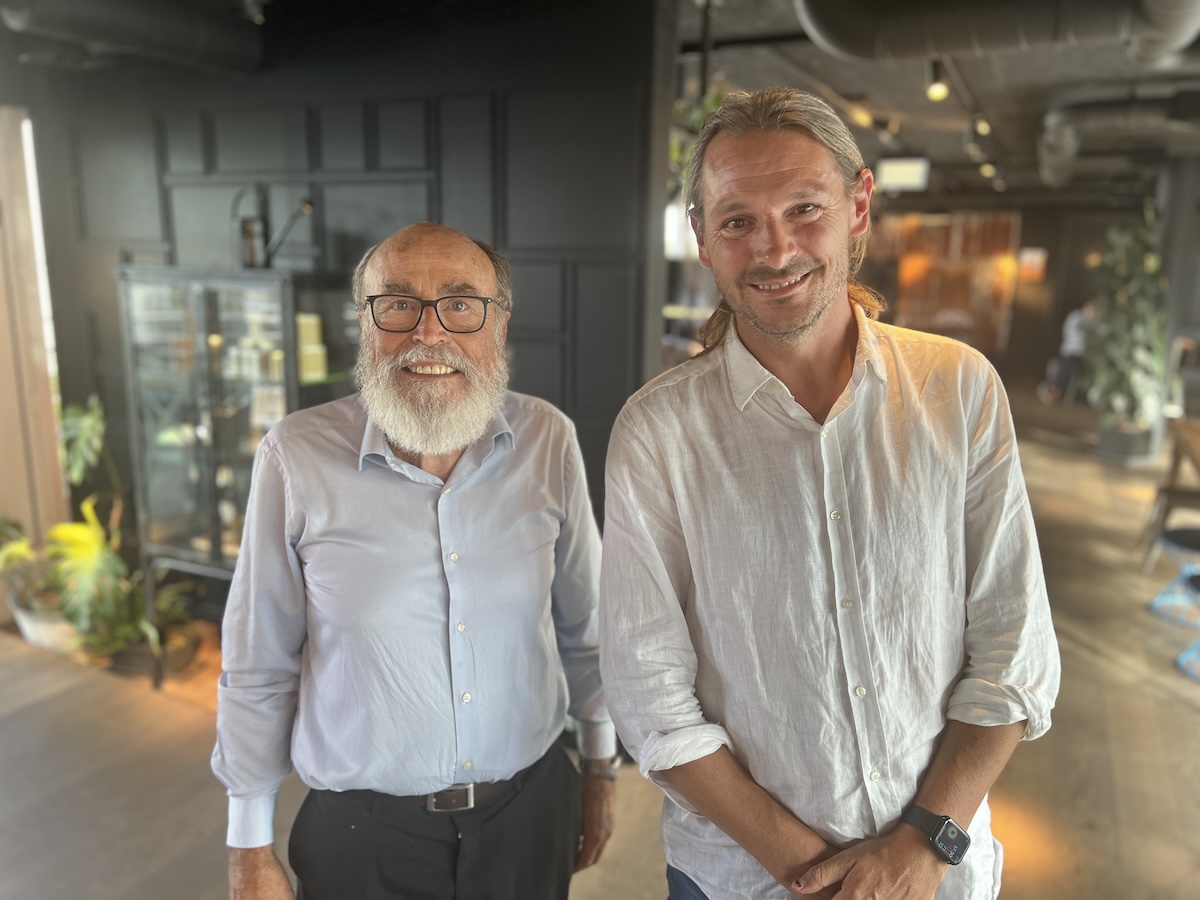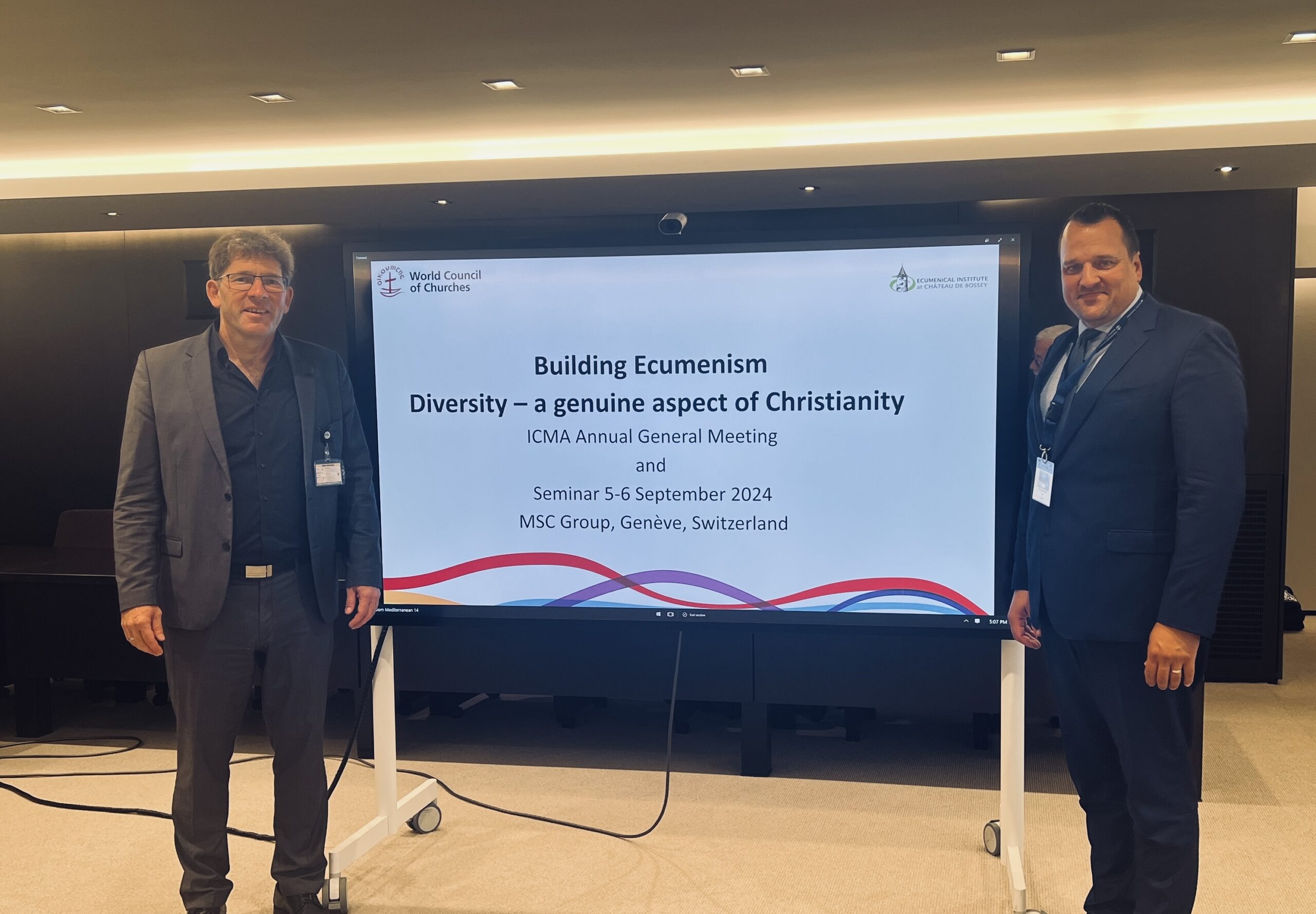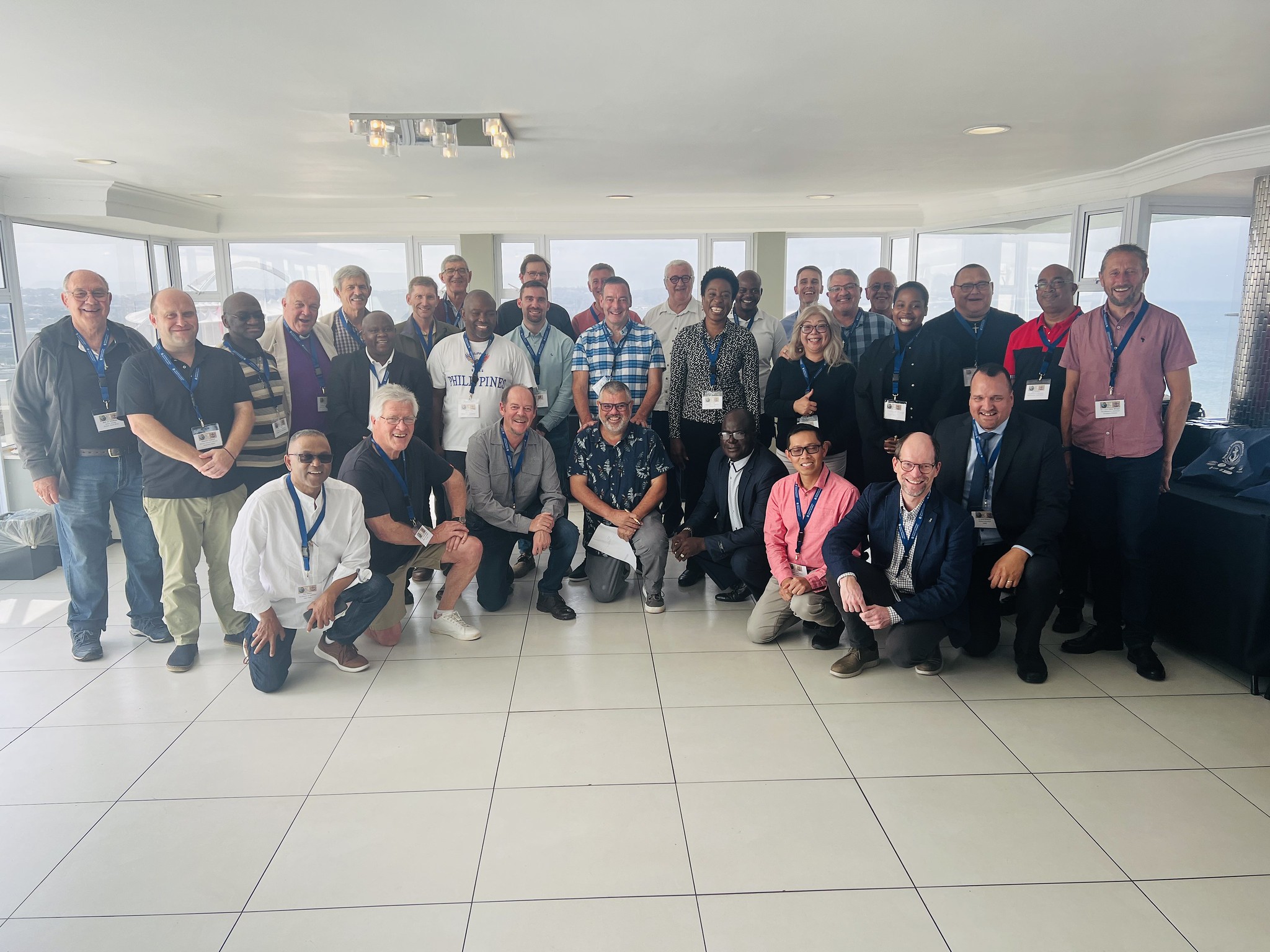Remarks delivered at the NAMMA Conference 2022 by the Rev’d Canon Andrew Wright, Secretary-General, The Mission to Seafarers.
It is a great pleasure to be back at NAMMA again. It is always a wonderful occasion. I am here both as the Chairman of ICMA, and once again I thank all of you at NAMMA for the strength of our relationship and for allowing our shared partnership in leadership (the great Jason) . I finish that role in September after four years and this will be my last visit here in that capacity. I am also here as Secretary General of The Mission to Seafarers. As such there are a number represented here with whom we have a particular and supportive relationship. We look forward to continuing to work closely with you all in our shared mission.
Every year at Sea Sunday time I focus on a different sea passage from the Scriptures. This year, however, I took what might be called a “no sea” passage. “And I saw a new heaven and a new earth; for the first heaven and the first earth were passed away, and there was no more sea.” You will be familiar with these words from Revelation 21. Beloved as a staple of funerals, they are the prelude to a wonderful vision of the future, when “God shall wipe away all tears from their eyes, and death shall be no more.” But as a child, the last of those words from verse 1 used to bother me – “and there will be no more sea”. I loved the sea then, as I do now. I loved swimming, I loved sailing, I loved ships, I loved the sound of the waves coming ashore and I loved watching the sun rise or fall over the ocean. So, a world without sea – unthinkable!
But the sea, in both Testaments, represents the forces of chaos. After all, the sea was a place of terrifying storm, it caused destructive and unpredictable flooding which could devastate life and livelihood, it even harboured dreadful sea monsters, the biblical Leviathans. No surprise then that in the symbolism of the Book of Revelation the vision of “no more sea” represented part of a vision of peace, an end to the storms which inflict us all in so many different ways.
We are living through a time of acute storm. Pandemic, war, climate emergency, economic fragility, political instability, the real threat of hunger for many millions. When I cycled 20 miles round London one Tuesday last month, smoke rising around me from the many destructive fires which erupted on that day of record temperatures, a full two degrees above anything we had experienced before, I could almost feel the horsemen of the apocalypse breathing down my neck. And many of these things, particularly most recently pandemic and Ukraine, have had a huge impact on us and on those we serve.
The waves have certainly threatened to overcome seafarers. You have all made an amazing response in the defence and support of crew over these last years with your gangway visitation, your shopping, your vaccinations, your free communication for Ukrainians and Russians and your pastoral support. It has been incredible, and it will not be forgotten.
But it is not only those we serve whom the waters of chaos have threatened. It is also us. I very often reflect on the fragility of life. How easily life can be turned upside down in an instant. We all know such fragilities, and seafarers ministry is not immune. Already before the pandemic, and I speak globally here, many models of maritime ministry were under pressure. Smaller crews, quicker turnaround times, increasing WiFi on board and, in many cases, easy access to the facilities of local communities were all playing their part. Globally enhanced security restrictions have often hampered maritime ministry. All that meant smaller footfall in many centres, and reduced income. The pandemic was a reminder of our own need for flexibility, for creativity and for new perspectives. At the Mission to Seafarers, centre usage was 93% down in 2021 from 2019 levels.
In some places we are now seeing some beginnings of a return to what we have referred to as “normality”. Although in many parts of the world that is far from the case, in Latin America and many parts of Asia for example. But here in the US, in Canada and in Europe many centres are seeing visitation again, albeit usually in very much reduced numbers. But what of the future? How quickly will shore leave restrictions, imposed or self-imposed, change? Seafarers themselves have got used to new patterns of working and living. Will their behaviour, even when allowed, revert to what they were before? – particularly with stronger and cheaper WiFi on board, much enhanced during the pandemic and now due to be undergirded in large measure by ILO requirement. In many places we are still restricted in our access to ships as well, although that too is beginning to change. Shopping has been a mainstay of our work, a wonderful and practical expression of the love and compassion that drives all our work. At MtS we delivered just under US$ 3 million worth of shopping in 2021, the result of almost 20,000 shopping trips. Throughout North America you have done fantastically on this front, and you led the world on vaccinations. Shopping and vaccination may continue in some form, and these are worth exploring, but they will inevitably reduce as a driving percentage of our ministry. Many of us have been badly impacted by the loss of our volunteers, sometimes dramatically so. Our volunteer workforce was often elderly and vulnerable – three years on many will choose not to return, or indeed be physically unable to do so. This is another factor impacting on us. It has been tough, and remains so for many.
Many churches use the phrase “liminal space”. These are spaces where you have moved beyond one way of being and are uncertain about the new ways of being ahead. Maritime ministry has been and to some extent remains in a liminal space. We can no longer guarantee the old realities but what sort of future can we expect?
Most importantly it is clear – seafarer need remains as great as ever!
In a heavily disrupted environment, crews and their families are often at the front line of impact. In a deteriorating security environment, I fervently hope and pray for peace, as do we all, but fear conditions are in place for further conflict, hitting who knows when and where and how? While the pandemic may appear to have faded in many places it is continuing to impact, sometimes harshly on seafarers as we are all acutely aware – with limitations on shore leave at the forefront. We are seeing new patterns of crewing in terms of nationality. Chinese crews present challenges because of ongoing severe travel restriction. Russian and Ukrainian crews present risk because of uncertainty. These are changing vulnerabilities for seafarers, quite apart from the potential impacts of growing automation. And seafarers will not be immune from the growing stresses of the economic environment, including levels of inflation which are rampant and destabilizing in some countries. All this on top of the normal challenges facing seafarers, of which I have no need to recount with any of you.
Of the need of your ministry – pastoral, practical and spiritual there is absolutely no doubt.
But as we have learnt there is going to need to be a great deal of thinking – and enhanced partnership between us as we work together to address issues, share the care and pool the resources in fast changing circumstances.
So a few brief thoughts
- I believe there will remain an important place for Centres. They will need to be in the right place and of the right model for each context. They will normally need, in my view, to be in or very close to the port. They need to ensure a very warm welcome, be fresh and attractive buildings and offer the services which seafarers actually want. The buildings themselves should raise the spirits. There are lots of ideas out there and in here as to possibilities. And décor? Too many centres around the world remain depressing in my view, particularly in interiors. Many have lacked investment to effectively transform them for a changed era. They should be “homes fit for heroes”, in my view prioritising green over blue – and flowers and plants over models of ships and lighthouses, or the ubiquitous life rings which seem to breed like rabbits in many centres. They need to be fresh and vibrant, themes perhaps in line with local context. (eg Tilbury, London – QVSR). In our MtS network we have some very big centres, and indeed some excellent partnership models where centres are shared with, for example, duty free shops. However, we suspect the future in many places is likely to be smaller centres, closer to the action, perhaps more than one per port, minimally but hospitably staffed, open all hours, flexibly modular (able to be moved if necessary) and potentially mobile. The pandemic has highlighted the possibilities and advantages of mobile shops or even welfare offices. Recently we have launched a trial to place and evaluate some modular and some mobile centres. Of course, many of you will wonder where the resource comes for new centres or even for improvement. We may not be able always to be able to think too big but we can look closely at ways of incremental change and surprising possibilities and partnerships can suddenly come from nowhere.
- Ship visitation as we all know must be at the core. Expanding ship visitation will be vital. We have just launched a major £750,000 programme to expand ship visitation over a three-year period across all our regions – and some of that resource is being deployed here in North America. Ship visiting should be planned and strategic, not just focusing on friendly or known ships. It should provide out of hours service (night shifts even? – Singapore example) wherever possible. Team building and collaboration is vital. As we all know and as so many of you are doing, more effort will need to go in proactively reaching seafarers, not just waiting for them to arrive.
- Digital work must increase in importance. Early in COVID we launched our Chat-to-a-Chaplain service. Some of you participated in that programme. At the peak of the pandemic it proved very important. The use has fallen away now but we have learnt many lessons from that and will be including a simpler version of it in our new Happy at Sea App. However, at a local level many chaplaincies from the full breadth of organisations are highly active, not only in the vital work of ensuring access to WiFi, through Centres, ports or MiFi units, but in sustaining relationships with seafarers through social media. While such digital work can never replace the value of face-to-face as some have suggested, it does provide a vital connection with seafarers – and indeed helps with that provision of continuity of care. This is something which is central to the working of our local MtS Chaplains. It is also built into our wider programme work. We have brought our suite of WeCare educational programmes fully on-line and, of course, our Seafarer Happiness Index, now increasingly used as a benchmark within shipping for assessing crew well-being, relies entirely on the digital input of seafarers. Our Happy at Sea App to be launched this Autumn will provide a range of services to seafarers. We are also committed users of the Sailors Society Ship Welfare Visitors App, as our core reporting tool.
- Youth! We need to further build younger team members. It has been a pleasure meeting some of your NAMMA interns here – one way of bringing younger players into our teams. We need them. Fresh faces. Tech savvy. Energetic. Seeing things with new eyes. Closer in age to seafarers. Internship is just one way of seeking such recruitment. Broadening the age and diversity profiles of our teams is essential if we are to survive and thrive into the future – and provide for succession planning.
- Financial sustainability. This is a big issue for all of us. Volunteering will remain vital but professional ministry, proper coverage, state of the art centres and effective transport fleets demand money – a lot of money in North America. There are no easy answers. Some exciting funding things are happening in certain places – and we will hear from New Zealand tomorrow. But of vital necessity as we all know, is industry funding. We offer Christian ministry but we are also a service deliverer within the shipping industry – in the seafarer happiness and well-being business, as important as delivering fuel or shifting containers. The shipping industry needs to fund us. Now raising such funding , especially at local level, is not easy but shipping is making a great deal of money and has to be a primary target for partnership, including funding.
- Finally, partnership. In all this working together is vital. Learning from each other. Offering mutual support and ideas. Such partnership ensures a wise use of resources, is demanded by those who fund us and provides the best joined-up care for seafarers.
My old headmaster used to say “any organisation that stands still goes backwards”. That has never been truer than now. Your work is desperately needed but times “are a changing” and we have to be entrepreneurial and creative as we rebalance our work in the light of fast changing circumstance if we are to continue providing relevant, vibrant and financially sustainable ministry to seafarers. Rooted in our core historic Christian purposes but open to a changing future.





